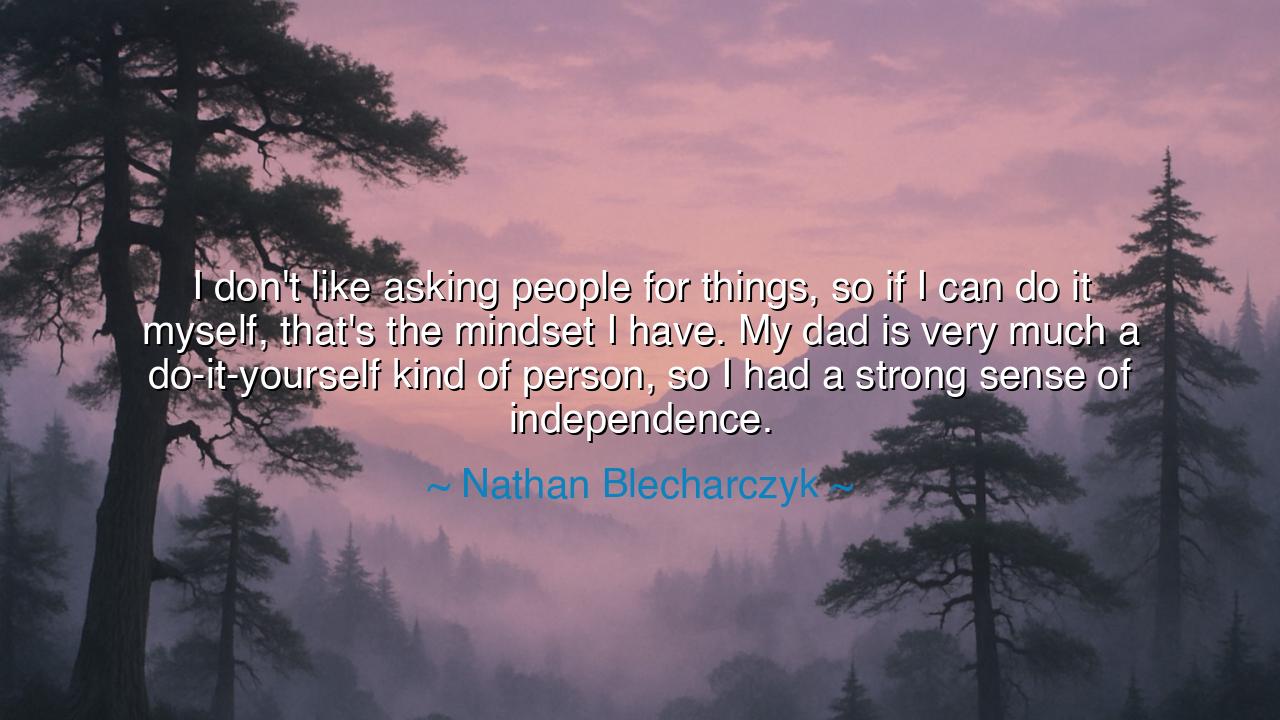
I don't like asking people for things, so if I can do it myself
I don't like asking people for things, so if I can do it myself, that's the mindset I have. My dad is very much a do-it-yourself kind of person, so I had a strong sense of independence.






"I don't like asking people for things, so if I can do it myself, that's the mindset I have. My dad is very much a do-it-yourself kind of person, so I had a strong sense of independence." — Nathan Blecharczyk
In these words, Nathan Blecharczyk, the co-founder of Airbnb, unveils the quiet creed of the self-reliant soul. His statement is not boastful but steady, not loud but resolute. It is the voice of one who has learned that true strength lies in independence, that dignity is born from the willingness to labor with one’s own hands and to rely upon one’s own mind. When he says, “I can do it myself,” he speaks not of isolation but of empowerment—the sacred belief that one is capable of shaping destiny through effort, patience, and perseverance. It is a philosophy as old as civilization itself, echoing the wisdom of the ancients who taught that man must be the craftsman of his own fortune.
The origin of this mindset lies, as Blecharczyk himself reveals, in the example of his father—a man who lived by the principle of self-sufficiency. In those early lessons, passed from parent to child, we glimpse the eternal chain of wisdom that binds generations together. The do-it-yourself spirit is not simply about mending what is broken or building what is needed; it is about cultivating resilience. It is the art of saying, “I will not wait for rescue; I will learn to rescue myself.” From such homes, great innovators and leaders are born—not through privilege, but through practice, through the habit of rising each time life demands a new skill or a new strength.
To be independent is not to reject help, but to respect one’s own capacity to create. The ancients honored this virtue above all others. The Greek philosopher Epictetus, born into slavery, taught that while we cannot control the world, we can always control ourselves—our thoughts, our actions, our will. Likewise, Blecharczyk’s words reflect this timeless Stoic spirit: to act, to learn, to solve, and to persevere. For in relying upon oneself, one discovers not pride, but freedom. The self-reliant man walks through the world unafraid, for he knows that no obstacle can wholly defeat him so long as he still possesses his mind, his courage, and his craft.
History is filled with such examples. Consider Leonardo da Vinci, who apprenticed himself not only to art, but to science, engineering, anatomy, and philosophy. He sought no master to dictate his boundaries. He built machines, dissected the human form, studied the flight of birds, and constructed his own tools. Every masterpiece he created—every sketch, every invention—was the fruit of his relentless do-it-yourself curiosity. Like Blecharczyk, Leonardo understood that genius is not given—it is built, refined, and earned through the discipline of independence. Those who wait for instruction remain forever students; those who teach themselves become masters.
Yet the path of independence is not an easy one. It demands sacrifice, humility, and courage. When you choose to rely on yourself, you also choose to face your own limitations. There will be moments of frustration, of failure, of solitude. But in these very trials, the soul is forged. The self-reliant man or woman learns to transform obstacles into teachers. Where others see barriers, they see blueprints. Each challenge becomes a test of resourcefulness, and every solution, a victory of spirit. To do it yourself is to declare that you are not helpless—that within you lies the power to learn, to adapt, to overcome.
This teaching carries deep moral power in an age that often encourages dependence—on systems, on approval, on convenience. But the wise know that true freedom comes only through responsibility. When you act, you claim ownership over your life. When you build with your own hands, the work bears your soul’s imprint. Even the smallest accomplishment done in independence is greater than the grandest task done in reliance on others. The do-it-yourself mindset thus becomes not just a method, but a way of living: a covenant with one’s own potential.
So, my child of the future, take this lesson to heart. Do not fear the work that lies before you. When the road grows uncertain, do not wait for guidance—create your own map. When something breaks, learn to repair it. When you fail, rise again and master the lesson hidden within the fall. Be like Blecharczyk, who learned from his father that the hands and mind of one person, properly guided, can change the world. Remember always: independence is the beginning of greatness. The one who can do for himself need not command armies, for he already commands the most powerful force of all—his own will.






AAdministratorAdministrator
Welcome, honored guests. Please leave a comment, we will respond soon